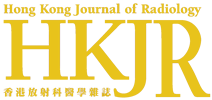Evidence-based Management of Gastric Cancer
YT Fu
Hong Kong J Radiol 2011;14(Suppl):S24-30
Gastric carcinoma is one of the most common cancers worldwide. Patients in the early stages of the disease experience non-specific symptoms. This contributes greatly to delayed diagnoses and poor prognoses, as reflected by low survival rates. Although surgical resection is currently the only curative treatment option, the management of gastric cancer has been rapidly evolving. The emergence of new chemotherapeutic agents and targeted biological therapies used as adjuvant treatments has contributed greatly to improved survival. In this patient group, there is clinical evidence favouring various types of adjuvant therapy in addition to surgery. However, there appears to be regional discordance in recommendations and clinical practice. Evidence from the United States supports the use of adjuvant chemoradiation. In a United Kingdom study, survival benefits were demonstrated with perioperative chemotherapy. In Asia, clinical evidence supports the use of postoperative chemotherapy. This underscores the lack of consensus between adjuvant gastric cancer treatment modalities. This paper presents the evidence for these various approaches to adjuvant treatments for gastric cancer. Importantly, data supporting the use of novel biological agents as part of multimodal treatment of unresectable gastric cancer are also reviewed.
中文摘要
胃癌的循證治療
傅耀彤
胃癌是最常見的癌症之一,在癌症初期不會有特定的症狀,導致耽擱診斷和不良預後,這從低生存 率可反映出來。雖然胃切除術為當前唯一的根治性治療選擇,但近年胃癌的治療方案進展迅速。作 為輔助治療,近年新化療藥和標靶生物療法的出現大大改善了胃癌存活率。有關胃癌的治療方法, 臨床證據傾向支持除手術外不同類型的輔助治療。然而,有關的治療建議和臨床應用似乎有地區性 分別——美國研究支持使用輔助合併化放療,而英國一項研究則指出圍術期化療有助改善存活率; 在亞洲,臨床證據支持術後化療。這更加說明在胃癌輔助治療方式上未取得一致意見。本文列舉各 種胃癌輔助治療的方式,重要的是,本文同時也回顧分析新的生物制劑作為對不能手術切除患者的 多模式治療的一部份。

